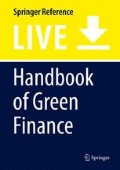Abstract
The Republic of Korea launched its green finance scheme in 2009, introduced the environmental information disclosure system in 2013, followed by the emissions trading scheme in 2015. Green finance is expanding as the government is making efforts to change the energy mix by decreasing the share of nuclear energy and increasing that of new and renewable energy. Private sector entities such as commercial banks, private equity funds, etc. are also attempting to revitalize green finance in the country. Changing the energy mix needs considerable financial resources, so the government is seeking to collaborate with private firms. Public support regarding the adoption of eco-friendly and energy-efficiency practices through green financing, public or private, is necessary, together with industrial support from the government and financial institutions.
References
Climate Bonds Initiative (2018) Korea climate bond market overview and opportunities
Government of the Republic of Korea (2015) Post 2020 GHG reduction target setup action plan
Government of the Republic of Korea (2016a) Fine dust management special measure established. Press release, 3 June
Government of the Republic of Korea (2016b) Fine dust management special measure action plan established. Press release, 1 July
Government of the Republic of Korea (2016c) First master plan on climate change preparation
Greenhouse Gas Inventory & Research Center of Korea (GIR) (2017) 2016 nation carbon inventory report
International Energy Agency (2013) Southeast Asia energy outlook
Kim C-H (2015a) Analysis on the effect of GHG reduction policy by firm size. Basic Research Report 15-10. Korea Energy Economics Institute
Kim S (2015b) What factors cause an increase of greenhouse gas emissions in Korea? Korean Energy Econ Rev 14(3.) (November):83–112
Kim G-H (2016a) Green energy cooperation research: Analysis on corporate value change according to the adoption of ETS. Basic Research Report 16–34. Korea Energy Economics Institute
Kim JH (2016b) Research on methodologies for policy flexibility of energy demand management: behavioral economy approach. Basic Research Report 16-06. Korea Energy Economics Institute
Kim YB (2017) Driving forces of the changes in GHG emissions of nuclear, new renewable energy. Korean Energy Econ Rev 16(1.) (March):119–162
Kim, G-H, Shim, S-H (2017) Diagnosis and improvements of Korean Emission Trading Scheme. Irregular Research Report 17-04. Korea Energy Economics Institute
Korea Economic Daily (2018) Pouring ESG bond, KEPCO and EWPC will issue green bonds. 11 June
Korea Energy Agency (KEA) (2017) 2017 Korea energy agency handbook
Korea Energy Economics Institute (2017) 2016 yearbook of energy statistics
Korea Environmental Industry & Technology Institute (KEITI) (2017) Presentation material of advisory meeting on environmental information disclosure
Korea Exchange (2018) Shinhan Bank issued Arirang green bond. Press release, 30 August
Korea Forest Service (2014) Implementation of climate change preparation carbon absorption source enhancement plan. Press release
Lee S-L (2015) Effect of emission trading scheme on electricity market under the 7th electric power supply and demand plan. Irregular Research Report 15-04. Korea Energy Economics Institute
Lee C-Y (2016a) Market acceptance analysis of distributed electricity based on new and renewable energy and expansion plan. Basic Research Report 16-10. Korea Energy Economics Institute
Lee SJ (2016b) Analysis on contribution types to post 2020 GHG emission reduction. Presentation material in the 2015 Research Performance Conference, Korea Energy Economics Institute
Lee JW, Lee JY (2017) Implication of issues in fine dust, humidifier sanitizer, and the safety of nuclear generation. KETEP Insight, July. Korea Institute of Energy Technology Evaluation and Planning
Ministry of Environment (2014) GHG and energy target management exceeds the GHG emission reduction target in 2012. Press release, 21 January
Ministry of Environment (2018) 1,777.13 MTOE, total allowance of greenhouse gas emission credit for three years. Press release, 12 July
Ministry of Strategy and Finance (2014) Emission trading scheme master plan
Ministry of Strategy and Finance (2017) Second emission trading scheme master plan
Ministry of Trade, Industry, and Energy (2014) Second energy master plan
Ministry of Trade, Industry, and Energy (2015) Seventh electric power supply demand plan
OECD (2015) Green bonds: mobilizing the debt capital markets for a low carbon transition
OECD (2017) Air quality and health: exposure to PM2.5 fine particles –countries and regions. OECD Environment Statistics (database). https://doi.org/10.1787/96171c76-en. Accessed 11 Dec 2017
Office of Government Policy Coordination (OGPC) (2014) Second five-year green growth plan
Office of Government Policy Coordination (OGPC) (2017) Government confirmed the resumption of the construction of Shin-Gori Unit 5&6 and energy conversion roadmap. Press release, 24 October
Oh S-S (2017) Problems and improvement direction of domestic district heating. Irregular Research Report 17-02. Korea Energy Economics Institute
Oh DK and Kim SH (2018) Green Finance in the Republic of Korea: Barriers and solutions, Working Paper Series No. 897, Asian Development Bank Institute
Park M-D, Jung Y-J (2016) Research on local economy promotion utilizing the distributed electricity. Irregular Research Report 16-08. Korea Energy Economics Institute
Public Opinion Committee on Shin-Gori Unit 5&6 (2017) Citizen-participation public opinion report on Shin-Gori Unit 5&6
Shim S-H (2016) Research on investment effect analysis and policy direction of energy efficiency improvement R&D. Basic Research Report 16-09. Korea Energy Economics Institute
Shim S, Lee J (2015) On inefficiency factors in Korean emission trading scheme. Korean Energy Econ Rev 14(2.) (September):177–211
UN Environment (2017) Green finance progress report
Author information
Authors and Affiliations
Corresponding author
Editor information
Editors and Affiliations
Rights and permissions
Copyright information
© 2019 Asian Development Bank Institute
About this entry
Cite this entry
Oh, D., Kim, SH. (2019). Green Finance in the Republic of Korea. In: Sachs, J., Woo , W., Yoshino, N., Taghizadeh-Hesary, F. (eds) Handbook of Green Finance. Sustainable Development . Springer, Singapore. https://doi.org/10.1007/978-981-10-8710-3_10-1
Download citation
DOI: https://doi.org/10.1007/978-981-10-8710-3_10-1
Received:
Accepted:
Published:
Publisher Name: Springer, Singapore
Print ISBN: 978-981-10-8710-3
Online ISBN: 978-981-10-8710-3
eBook Packages: Springer Reference HistoryReference Module Humanities and Social SciencesReference Module Humanities

